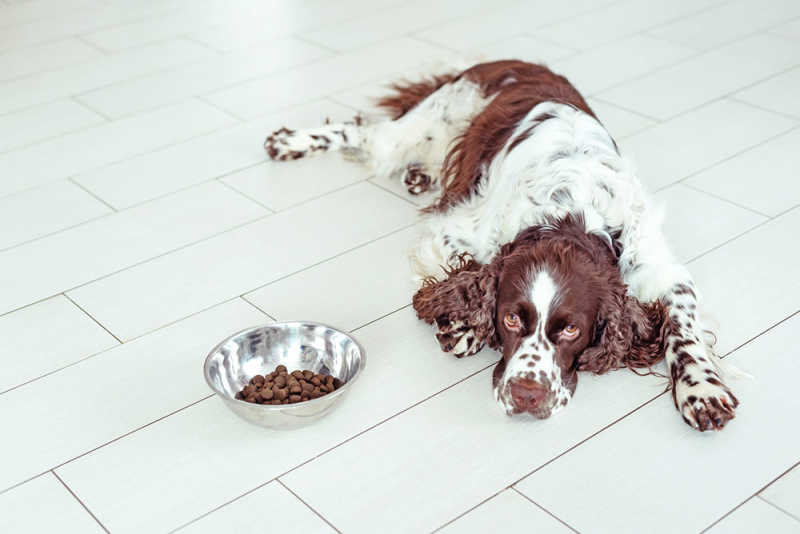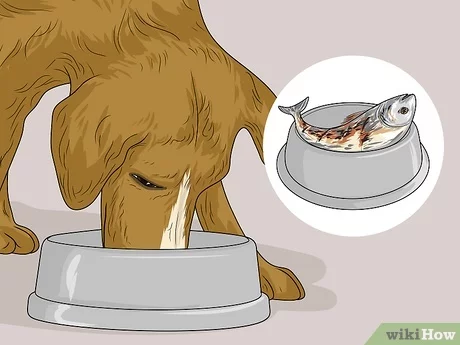To feed a sick dog that will not eat, consider offering bland, easily digestible foods like boiled chicken or rice, canned plain pumpkin, or plain yogurt to entice the dog to eat. These options are gentle on the stomach and may help stimulate the dog’s appetite.
It’s important to consult with a veterinarian to determine the best course of action for your sick dog’s specific condition. A loss of appetite can be a sign of illness, so it’s crucial to address the underlying health issue while also finding ways to encourage the dog to eat and stay hydrated.
Caring for a sick dog that won’t eat can be concerning for pet owners. It’s essential to provide appropriate nourishment to aid in their recovery. This article will cover helpful tips and suggestions to encourage a sick dog to eat and provide them with the necessary nutrients to support their well-being. Whether it’s a temporary illness or a more serious health concern, knowing how to nourish a sick dog is crucial for their comfort and recovery.

Credit: www.wikihow.com
Importance Of Proper Nutrition
Proper nutrition is crucial for a sick dog that refuses to eat. Providing highly palatable, easily digestible food options can help support their healing process and ensure they receive essential nutrients to regain their strength.
Nutritional Needs Of Sick Dogs
A sick dog requires proper nutrition to aid in its recovery. It is crucial to understand the nutritional needs of sick dogs in order to provide them with the best support during this time. While it may be challenging to entice a dog that refuses to eat, it is important to find the right mix of foods and supplements that can help them regain their strength and support their immune system. Providing the necessary nutrients will not only aid in their recovery but also enhance their overall well-being.Effects Of Poor Nutrition On Sick Dogs
Poor nutrition can have detrimental effects on sick dogs, hindering their ability to heal and recover. When sick dogs do not receive proper nutrition, their immune systems become compromised, making them more susceptible to infections and diseases. Additionally, a lack of nutrients can lead to muscle wasting and weakness, leaving the dog with reduced energy levels and the inability to fight off their illness. Providing the right nutrients is essential to prevent further complications and expedite the healing process.Nutritional Recommendations For Sick Dogs
When it comes to feeding a sick dog, it is important to focus on easily digestible and highly nutritious foods. Some suggestions include:– Boiled Chicken: This lean protein source is gentle on the stomach and provides the necessary amino acids for tissue repair. – Rice or Pasta: These carbohydrates serve as a great energy source and can be easily digested. – Green Leafy Vegetables: These provide essential vitamins and minerals to support the immune system. – Bone Broth: This nourishing liquid is packed with nutrients and can help stimulate appetite. – Probiotics: These supplements promote healthy gut bacteria and aid in digestion. It is essential to consult with a veterinarian for specific recommendations based on your dog’s individual needs. They might recommend additional supplements such as omega-3 fatty acids or vitamins to further support their recovery. Remember to start with small portions and gradually increase the amount as their appetite improves.Conclusion
Proper nutrition plays a vital role in the recovery of a sick dog. By understanding their nutritional needs, the effects of poor nutrition, and implementing appropriate dietary changes, you can ensure your furry friend has the best chance of a full and speedy recovery. Providing them with easily digestible and nutrient-rich foods will not only support their immune system but also give them the strength they need to regain their vitality. Remember, consult with your veterinarian for personalized advice and always monitor your dog’s progress closely.
Credit: www.wilsonspetfood.co.uk
Determining The Cause Of Decreased Appetite
Common Causes Of Decreased Appetite In Sick Dogs
There are several reasons why a dog may experience a decreased appetite when they are unwell. Illnesses such as kidney disease, liver disease, and gastrointestinal issues can significantly impact a dog’s desire to eat. Dental problems, pain, and medication side effects are also common causes of decreased appetite in sick dogs.
When To Consult A Veterinarian
It is essential to monitor a dog’s appetite closely when they are unwell. Any persistent refusal to eat or drink, especially if accompanied by other symptoms such as vomiting, diarrhea, or lethargy, warrants immediate veterinary attention. Rapid weight loss and dehydration are also indicators that require prompt consultation with a veterinarian.
Adjusting The Diet For A Sick Dog
Adjusting the diet for a sick dog is crucial to promote healing and provide necessary nutrients. When a dog is ill, they may not have an appetite, making it challenging to ensure they receive adequate nutrition. However, there are specific approaches to feeding that can aid in the recovery process and encourage a sick dog to eat. This article will discuss the best way to feed a sick dog that will not eat, focusing on soft and palatable foods as well as feeding smaller, frequent meals.
Soft And Palatable Foods
When a dog is sick and refusing to eat, offering soft and palatable foods is essential. Boiled chicken, plain rice, and canned pumpkin are examples of easily digestible and appetizing options. These foods are gentle on the stomach and can entice a sick dog to eat. Mixing in a small amount of low-sodium chicken broth can also enhance the flavor and aroma, making the food more appealing to the dog.
Feeding Smaller, Frequent Meals
For a sick dog that will not eat, providing smaller, more frequent meals throughout the day can be more enticing and manageable for their digestive system. Splitting their daily portion into several small meals can help prevent overwhelming the stomach and encourage them to consume smaller amounts. This approach can also support better nutrient absorption and maintain their energy levels during the recovery process.

Credit: www.smalldoorvet.com
Specific Foods For Sick Dogs
When your furry friend is feeling under the weather, finding the right foods to entice them to eat can be a challenge. However, specific foods can help soothe their digestive system and provide the necessary nutrients. Here are some beneficial options to consider:
Boiled Chicken And Rice
Boiled chicken and rice is a classic choice for dogs with a decreased appetite or stomach upset. The bland nature of this combination helps to calm their digestive system while providing easily digestible protein and carbohydrates. The chicken should be boneless, skinless, and unseasoned, allowing your dog to reap the full benefits of this gentle meal.
Canned Pumpkin For Digestive Issues
Canned pumpkin is a fantastic remedy for digestive issues in dogs. Rich in fiber, it aids in regulating their bowel movements and can alleviate both constipation and diarrhea. Be sure to opt for plain canned pumpkin without any added ingredients such as sugar or spices. Additionally, consult your veterinarian for the appropriate serving size based on your dog’s size and condition.
Supplements For Sick Dogs
When a dog is feeling sick and refuses to eat, it becomes a major concern for pet owners. However, there are supplements that can help boost their appetite and aid in their recovery. These supplements are specifically designed to provide essential nutrients that can support a sick dog’s overall health. Two important supplements that can make a difference in your furry friend’s well-being are probiotics and omega-3 fatty acids.
Probiotics For Gut Health
Administering probiotics to a sick dog can have a positive impact on their gut health. Probiotics are beneficial bacteria that help promote a healthy digestive system. They help to restore the balance of good bacteria in the gut, which can be disrupted when a dog is sick or on medication. Probiotics can aid in reducing gastrointestinal issues, such as diarrhea or vomiting, and improve nutrient absorption.
Probiotics can be found as supplements in various forms, such as powders or chewable tablets. When choosing a probiotic, look for a product specifically made for dogs, as the bacterial strains and dosage may differ from those intended for humans. It’s best to consult with your veterinarian to determine the appropriate probiotic for your sick dog.
Omega-3 Fatty Acids For Joint Inflammation
Omega-3 fatty acids are essential nutrients that play a crucial role in maintaining overall health in dogs. These healthy fats are particularly beneficial for dogs with joint inflammation caused by conditions like arthritis. Omega-3 fatty acids have anti-inflammatory properties that can help reduce pain and swelling while promoting joint mobility and flexibility.
You can find omega-3 fatty acids supplements specifically formulated for dogs in the market. These supplements are usually derived from fish oil, which is rich in beneficial omega-3 fatty acids like EPA and DHA. It’s important to choose a supplement that is specifically made for dogs and follow the recommended dosage based on your dog’s weight. As always, consult with your veterinarian before introducing any supplements to your dog’s diet.
Frequently Asked Questions Of What To Feed A Sick Dog That Will Not Eat
What Are Some Easy-to-digest Foods For A Sick Dog?
Some easy-to-digest foods for a sick dog include boiled chicken, rice, pumpkin, and plain yogurt. These foods are gentle on the stomach and can help provide essential nutrients while being easy on a dog’s digestive system.
Can I Give My Sick Dog Chicken Broth?
Yes, you can give your sick dog chicken broth. Chicken broth is a great option to keep your dog hydrated and provide them with some essential nutrients. Just make sure the broth is low in sodium and does not contain any onions or garlic, as these can be harmful to dogs.
Should I Force-feed My Sick Dog?
It is not recommended to force-feed a sick dog. Forcing food can actually do more harm than good and may cause further discomfort or vomiting. It is best to consult with a veterinarian to determine the underlying issue and the best course of action for your sick dog.
They may be able to recommend alternatives or suggest appetite stimulants if necessary.
Conclusion
To sum up, feeding a sick dog that refuses to eat can be a challenging situation for pet owners. However, with proper care and patience, it is possible to find options that will entice their appetite and provide them with the nutrients they need to recover.
Remember to consult with a veterinarian for specific dietary recommendations tailored to your dog’s condition. Rest assured that by following these tips, you can help your sick dog on their road to recovery.



